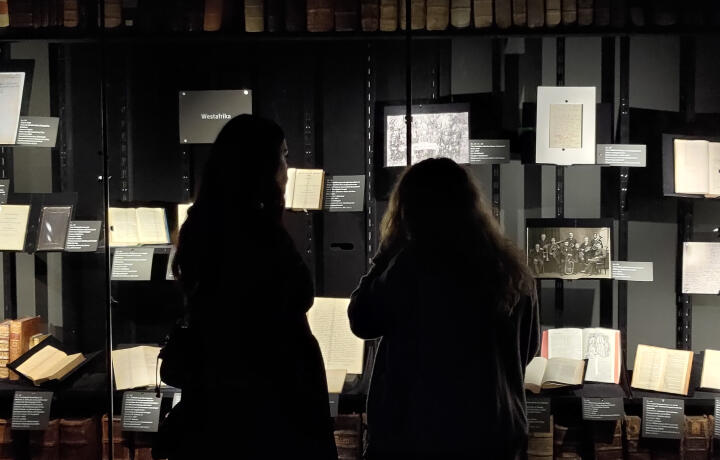Confrontation with the Present
Photos

‘It is not a matter of course that we are allowed to display our scientific work in such a magnificent museum,’ said Dr Felicity Jensz on Friday evening (10 October) at the opening of the ‘Global Bible’ exhibition. The head of the “GloBil” research project at the University of Münster, which has been running for three years in collaboration with the University of Bristol, deals with (post)colonial Bible translations in the Arctic, Oceania and West Africa. A particular focus of the project is on the work of indigenous translators, who have often been overlooked in the past. None of their names have been recorded, even though without them it would not have been possible for German and English missionaries to bring the Bible and the associated beliefs and way of life to the people in the colonies.
‘For one must [...] watch how they speak and interpret accordingly; then they will understand,’ Martin Luther had already stated as his credo in his ‘Letter on Interpretation’ in 1530. ‘Target group-oriented language’, as museum director Prof. Holger Strutwolf modernised Luther's phrase, was an extremely laborious undertaking, requiring the various languages in an occupied area to be recorded, structured in dictionaries and grammars, and then consolidated in Bible prints.
This endeavour was also influenced by political, religious and economic structures, as reports from Bible societies show. ‘But the archives mainly preserve the history of the colonial rulers. We want to counter this with contemporary artistic perspectives,’ emphasised Felicity Jensz at the opening. In their artworks created especially for the exhibition, Manfred Wkeng Aseng and Leeza Awojobi have examined what the circumstances of that time mean for today's global society. The English-Cameroonian artist Awojobi was present on Friday and recited her poem ‘Mawuta o Maliha - Tre(r)asures in the Water’. This poem is part of a video installation that is shown in the exhibition together with three pictures by Manfred Wkeng Aseng.
Every Sunday at 3 p.m., there is a public guided tour of the special exhibition. Registration is not required and admission is free.





